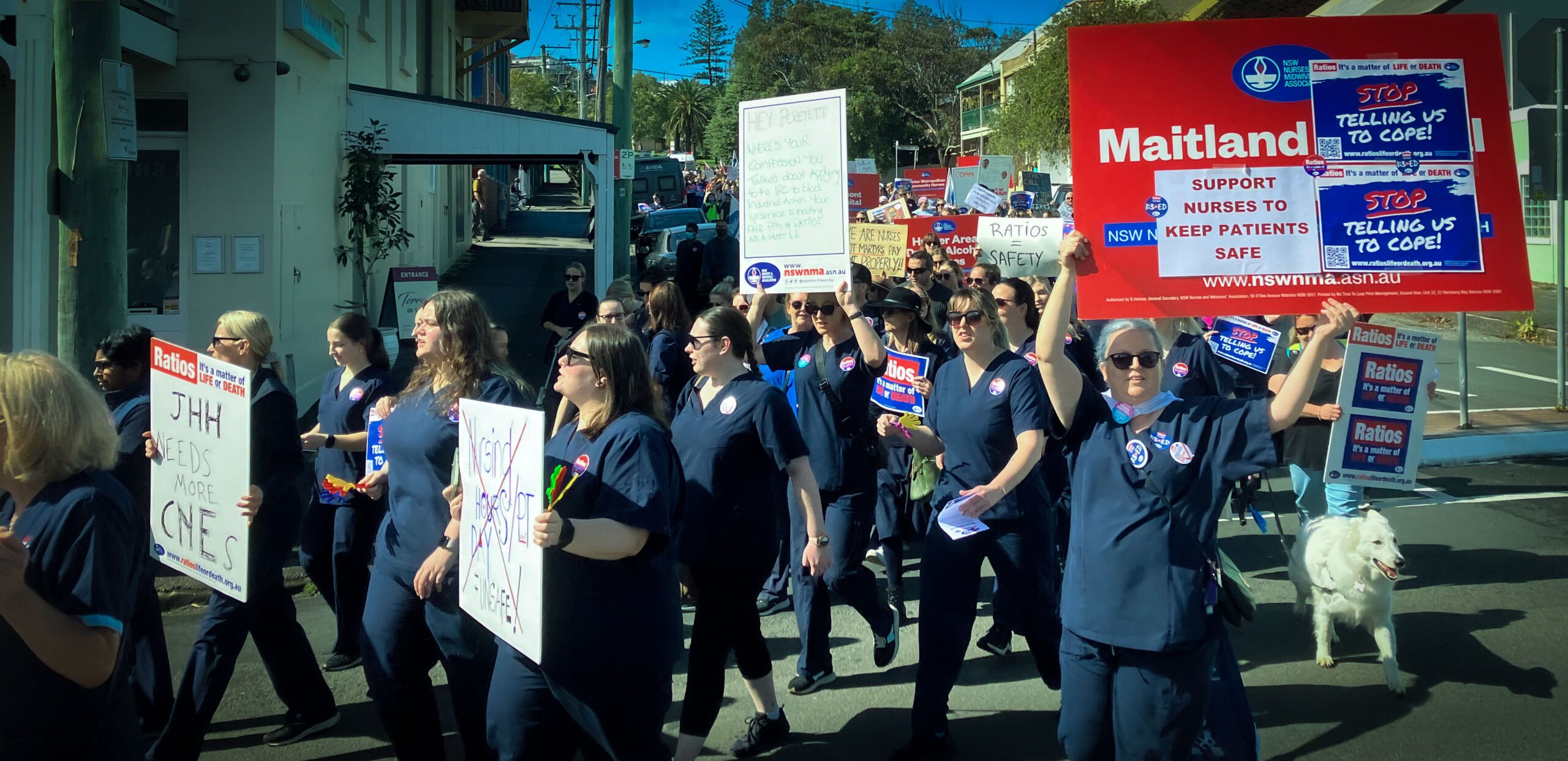Jan Barham MLC (Greens), Robert Borsak MLC and Robert Brown MLC (Shooters, Fishers and Farmers Party) spoke in the NSW Parliament on Wednesday 8 March about the need for registered nurses around the clock in aged care homes. Here is the Hansard record of their speeches.
Report: Registered Nurses in New South Wales Nursing Homes
The Hon. ROBERT BROWN [5.16 p.m.]: I speak to the final report of the General Purpose Standing Committee No. 3 on the inquiry into registered nurses in New South Wales nursing homes. I will start with a quotation:
- The moral test of government is how that government treats those who are in the dawn of life, the children; those who are in the twilight of life, the elderly; those who are in the shadows of life, the sick, the needy and the handicapped.
That quote is from the last public speech of former United States Vice President and Senator Hubert H. Humphrey. His words, spoken at the dedication of a new building for the United States Department of Health, Education, and Welfare, are inscribed at its entrance to serve as a reminder of the duty we owe our most vulnerable citizens. Never have Humphrey’s words been more relevant than they are to the report before the House. Registered nurses must remain in nursing homes. I believe that is an imperative. Members would be aware that in New South Wales we stand alone in having a requirement enshrined in law that a nursing home must have at least one registered nurse on staff at all times. It is included in section 104 of the Public Health Act 2010 and has been a legal requirement since the Public Health Act 1991, as stated in section 52, and earlier legislation.
The community would be forgiven for thinking it was a new requirement, given some of the submissions made to the inquiry. The situation in which we find ourselves with respect to the legal requirement to have at least one registered nurse on staff at all times is as a result of Federal legislative changes to the Commonwealth Aged Care Act 1997 through the Aged Care (Living Longer Living Better) Act 2013.This Act included a vast array of amendments that sought to improve areas of aged care and to facilitate the transfer of residents from low-care to high-care facilities. An indirect consequence was to negate section 104 of the New South Wales Public Health Act 2010 by removing the minimum staffing requirement. I said that it was an indirect consequence; I hope it was also an unintended consequence.
This provision was grandfathered to cover existing facilities by the Public Health Amendment (Nursing Homes) Regulation 2014, but new facilities were exempt. This means that those facilities could be without a registered nurse on staff and, instead, could employ staff with a lesser scope of practice. Another consequence of the Living Longer Living Better provisions was that, on the whole, nursing homes became more profitable. Funny about that! Indeed, removing the requirement to staff a nursing home with a registered nurse would generate a saving of about $18,000 per facility, based on an extrapolation of the figures quoted by UnitingCare in its submission. It concerns me, and I am sure a lot of other members of this House, that the 3.1 million elderly Australians who are aged over 65—according to the 2011 census 14 per cent of whom are in New South Wales—must now have the motivations of their carers in the back of their mind.
It is also worth noting that three major nursing homes providers floated their companies on the Australian Securities Exchange in anticipation of or soon after the passing of this bill. They are Japara Healthcare, Regis Aged Care, and Estia Health Limited. Estia Health Limited posted profit guidance for the 2016 financial year of over 25 per cent, up from the previous year of 20 per cent. These three companies’ share prices have risen since 2015 by a figure of between 20 per cent and 40 per cent, despite the current economic headwinds plaguing other industries. It seems there has never been a more exciting time to churn a profit from old people in nursing homes. That applies to aged care and to care for disabled persons. I understand that these three companies were contacted by the committee chair for comment. Their absence from the list of submissions speaks volumes.
We cannot put a price on a person’s life. If, as was said by the many operators who made submissions to this inquiry, it would be unprofitable to guarantee one registered nurse on staff at all times in a nursing home, then the Government needs to step in, particularly in rural areas. I especially note the submission by the New South Wales Country Women’s Association, which stated that having a registered nurse on staff in a nursing home is “essential” to “ensure quality care”. The skill and expertise that a registered nurse brings to the care of our elderly cannot be dismissed. The Shooters and Fishers Party is soon to become the Shooters, Fishers and Farmers Party. My Shooters and Fishers Party colleague Robert Borsak will examine this matter further in his contribution.
I have personal experience of the issues in this area. I have a relative who resides in one of these facilities. Because of the size of that facility, there are two registered nurses on duty at all times. I would hate to think how that facility would run without registered nurses. I thank all those who contributed to this worthwhile inquiry. I thank the members of the General Purpose Standing Committee No. 3, the community groups and interested parties who made submissions, and the countless constituents who contacted my office directly on the issue of nursing staffing levels in nursing homes.
I do not often give public plaudits to the NSW Greens but the committee chair, Ms Jan Barham, deserves congratulations on her conduct of this inquiry, her first as committee chair. I was surprised, however, by the conduct of some committee members from other parties, even some who formerly were nurses. As we are in the process of changing our name to the Shooters, Fishers and Farmers Party, we understand that rural health and aged care must be at the forefront of the priorities of this Parliament.
Finally, I draw to the attention of honourable members a matter that really hits home the importance of this issue. This morning my office received a call from Ted Pickering, a member of the Legislative Council from 1976 to 1995. He currently resides in a retirement village at Stanwell Park. He wanted to bring to light a vast array of issues he has encountered in his own care. His was a sobering account of maladministration. It shows how even former members of Parliament are not immune to the effects of aged care management. With all due respect, all of us will probably end up in aged care some day, although not necessarily at the Stanwell Park aged care facility.
The way we, as legislators, deal with aged care affects us all. It affects members in this Chamber and in the other place and it affects our constituents. It affects our families, including our parents and our grandparents. Future generations will judge us on how we treat those in the twilight of their lives. Before I commend the report to the House, I point out that there is still a preponderance of the use of a term in government policies, statements, press releases, et cetera, that is, the word “aged” linked to the word “burden”. It is unconscionable. I commend the report to the House.
The Hon. ROBERT BORSAK [5.25 p.m.]: I received a letter on 23 June last year that I would like to share with the House. It is pertinent to this debate. It reads:
- In a rural low care facility with 24/7 registered nurse cover the Director of Nursing and Deputy Director of Nursing take turns to be on-call and drive in (approximately 30 minutes on country roads) when a resident requires Schedule 8 medication regularly or PRN (when necessary) after hours. For one resident a syringe driver … was used to provide a continuous infusion of medication in the absence of a registered nurse being on duty to provide pain relief when required … When the syringe driver faults or alarms the unregistered care staff must turn the pump off and on again, calling the Director of Nursing … to return to the residential aged care facility after hours. This occurred in two instances recently, and … the resident was … without timely access to pain relief … for an extended period of time.
This story, sent to me by Bronwyn Heron, chairperson of the Palliative and Aged Care Network in New South Wales and a palliative care clinical nurse consultant, strikes to the heart of this inquiry. Facility managers and, I fear, the Liberal-Nationals Government want the public to think that this report is looking at numbers on a sheet of paper. As an accountant for over 40 years, I understand this consideration, but the issues covered in this report can have a devastating effect on the lives of our most vulnerable, our elderly.
I wish to continue on from the points raised by my colleague the Hon. Robert Brown. Honourable members already know that our party is changing its name to include a direct reference to farmers. Our State’s regions have always been a key focus of ours, so we want there to be no question about whom we represent. To say that there is room for improvement in rural health is an understatement. Recently, the Royal Flying Doctor Service highlighted data that showed Australians in remote areas are about 1.8 times more likely to die from an injury than are residents of major cities. It also showed that the rate of deaths from poisoning was 3.5 times higher in remote areas than in cities, and children in remote areas were 2.2 times more likely to be hospitalised for an injury. Although more than two-thirds of Australia’s population live in major cities, more than half of road fatalities occur on rural and remote roads.
The letter I just relayed included the story of two registered nurses who are putting themselves at risk driving on rural roads at night to ensure palliative patients receive adequate medication. With this in mind, the Shooters and Fishers Party unreservedly supports the requirement to have at least one registered nurse on staff at all times in a nursing home 24/7 as part of our broader policy on improving rural healthcare services. We also note that the Queensland Labor Government has plans to introduce similar legislation in its jurisdiction, copying the New South Wales model.
The exemption from the requirement in recommendation 8 of the report is one that concerns us, that is, the ability for nursing home facilities to apply for an exemption on a case-by-case basis. While we note that the Health Services Union is in favour of this measure to promote the viability of the not-for-profit sector, we do not want to see a situation where every facility across the State applies for an exemption. We realise that in some cases an exemption may genuinely be required but we want more checks and balances put in place to ensure the exemption is not abused. We especially support recommendation 15, which addresses wage disparity for registered nurses in aged care compared to those in public hospitals; and recommendation 14, which calls for increased funding and training for registered nurses in rural and regional universities.
At the core of this matter we find a conundrum. Registered nurses training and graduating in this State are often unable to find jobs in their first year or “new graduate year” in the workforce. Many others are not able to find work after that year post-graduation because those graduate positions are often floating one-year roles and do not guarantee long-term employment. I find it surprising that on one hand we are often led to believe that rural areas are desperate for nurses and other health professionals, even some rural nursing home facilities in this inquiry raised this point. However, many graduate nurses across the country cannot find work. I recall in 2014 an ABC Lateline story covered this shortage, which reported:
- About 8,000 nurses graduate from Australian universities each year. But this year up to 3,000 cannot find work.
It blamed 457 visas, but more recently health funding cutbacks have also hit hard. For those who read the Notice Paperreligiously—I am talking about the Hon. Walt Secord—they will notice that my colleague the Hon. Robert Brown and I posed a number of detailed questions to the Minister for Health concerning nursing home administration, graduate positions and employment rates in this State. Few of those questions were answered. The reason given was that the Minister has washed her hands of responsibility for health administration, and she deferred to the relevant local health districts or the Australian Health Public Practitioner Regulation Agency. This is part parcel of what O’Farrell started and what Baird seems to be continuing—a Government without responsibility.
Health is a major component of the overall State budget expenditure and it is always among the first to receive cutbacks to balance the budget. However, the real impact on the ground of this short-sightedness has far greater costs that are left off the balance sheet. That is why we are in favour of legislated nurse-to-patient ratios, especially for nursing homes as per the recommendations in this report. I hope the Government will take in the recommendations genuinely, but I will not hold my breath. There are many other issues that need airing, especially issues relating to rural health; this report scratches only the surface. I urge members to remember that what we do here for aged care will affect real people and will one day affect us all. I am keen to hear what members of The Nationals will say about this and whether they will generally advocate for the bush or whether Government solidarity will kick in. Their inaction and surprising behaviour during the inquiry towards some witnesses further reinforces that there is only one true electable advocate for rural New South Wales and that is the Shooters, Fishers and Farmers Party.
Ms JAN BARHAM [5.32 p.m.], in reply: In 2013, the late Adele Horin described the experience of placing her mother-in-law into a nursing home in 1996. She stated that within two weeks of entering care her mother-in-law went from a placid, smiling and unsuspecting physically healthy woman to a dazed, drugged, shuffling shadow of her former self. Her mother-in-law was being given the major tranquilliser Seranace, even though she had never needed medication before and had never suffered from a fall. Although there has been reform of the aged care system since 1996, Adele asked, “How far has aged care in Australia really come?” Mrs Jo-Anne McKeough told the inquiry, “The generation that contributed so much to the generations after them deserve safe and skilled care.” It seems we have not come so far since 1996. The “Living Longer Living Better” reforms have led to a greater commercialisation of the sector and aged care providers are reportedly making record profits yet spending less on skilled care. The care of our older vulnerable people in nursing homes must be a priority for the New South Wales Government and its inquiry into registered nurses in New South Wales nursing homes showed that we still have a lot of work to do to ensure that our older people get the best quality care.
I thank members who spoke to this report for their contributions, including Committee members the Hon. Courtney Houssos, the Hon. Walt Secord, the Hon. Bronnie Taylor, the Hon. Natasha Maclaren-Jones, the Hon. Paul Green, Reverend the Hon. Fred Nile, the Hon. Robert Brown and the Hon. Robert Borsak. The views presented in this inquiry were often polarised and I appreciate the efforts made by Committee members for working constructively together. I thank everyone who made submissions to this inquiry, particularly members of the community who shared personal stories about their experience of the aged care system. It was often those stories that underscored the need for registered nurse care in our nursing homes.
Imelda Gilmore said of her 67-year-old husband who has dementia and lives in a nursing home, “My heart’s desire is to know that someone is caring for him the way I would if I could.” Gerontologists, doctors, nurses, senior organisations, aged care operators and other experts in the field all agree that the kind of care that Mrs Gilmore wants for her husband may only be achieved in a nursing home with a registered nurse on duty at all times. No longer are our nursing homes the domain of people who need help only with showering and dressing. The inquiry heard that the average age of entry into a nursing home is now 84 years. The vast majority of nursing home residents have complex care needs that require registered nurse care at any time of the day or night.
In New South Wales, 75 per cent of nursing home beds are now occupied by people with high-care needs. In 2004-2005 that percentage was 64 per cent. People are entering nursing homes later in life and they are frailer. On top of complex care needs, most residents have dementia, which often requires highly specialised care. Brendan Moore of Alzheimer’s Australia told the Committee that behavioural symptoms of dementia, which are known as expressions of unmet need, can include psychosis, aggression and hallucinations. Those serious episodes often occur at night. They cannot be managed by a personal care worker who has had only a few hours of dementia care training. To be effectively managed, those episodes require the care and professional judgement of an experienced registered nurse. Registered nurses are trained to recognise symptoms that may indicate a serious condition and they can respond accordingly. Where there is no registered nurse, people are often transported to emergency departments. Professor Colleen Cartwright told the inquiry:
- Crisis events, by their very nature, are unpredictable. If there is no RN on duty, the enrolled nurse or assistant in nursing on duty may have no option but to send the person to hospital.
We heard that ambulance transfers are often made at nights and on weekends, but there does not seem to be any collated analysis by NSW Health of those transfers. Recommendation 1 calls on the New South Wales Government to collect and analyse data on the transfer of residents from aged care facilities to emergency departments and to report this information in the annual reports of NSW Health. In other words, if there is no registered nurse available to help someone with complex needs, the New South Wales health system will pick up the tab. I am not arguing against the right of nursing home residents to access our hospital system. On the contrary, they are entitled to the care they need wherever that may be. I am saying that registered nurses in nursing homes reduce unnecessary transfers to emergency departments, which is good not only for our hospital system, but it is generally in the best interests of the older person.
I note that Government members on the Committee did not support recommendations 4 and 15, which call on the Government to establish minimum staff-to-resident ratios and to improve the wages of people working in aged care. Those recommendations arose from evidence that some nursing homes may be dangerously understaffed but they still managed to pass accreditation checks. One nurse or carer looking after 30 to 40 residents is not appropriate. We have ratios in child care but not in aged care, despite the vulnerability and frailty of aged care recipients.
The Hon. Robert Brown: Because the aged are a burden. Didn’t you know that?
Ms JAN BARHAM: I acknowledge the comments of the Hon. Robert Brown and his use of the term “burden”. I agree; it is abhorrent. The inquiry also heard of the lower wages paid to nurses working in the aged care system compared to those of their counterparts in public hospitals. This issue must be addressed and that is why recommendation 15 calls on the Commonwealth to address this disparity. A personal care worker is paid less than someone who makes our coffee. What does this say about how we treat our elderly? Why do we not pay someone who cares for our loved ones more than someone who makes our cappuccino?
We must recognise that if we are to value our elderly, we need to value the people looking after them. Care workers and nurses are more likely to feel valued and respected if they are adequately remunerated. The committee recommended that nursing homes looking after people with complex needs must have a registered nurse on duty at all times in the interests of resident safety. However, the committee recognised that in some limited circumstances this may not always be possible. There are some small rural and remote facilities that do not have the income to employ a registered nurse 24/7 or access to available registered nurses. Recommendation 8 allows some facilities to apply for an exemption to the regulation, acknowledging the unique difficulties those facilities face.
Our inquiry recommended that the Government implement training and incentive programs to support registered nurses to work in regional, rural and remote areas. Dr Maree Bernoth said that there is no support for graduate registered nurses to stay in rural and regional areas. She said that rural facilities need registered nurses because often there is no doctor and that the registered nurse is integral to providing quality care in those facilities. The exemption is not intended to be used by facilities to avoid their responsibilities of care. A metropolitan nursing home with high-needs residents should provide 24/7 registered nurse care.
To assess this an independent panel of gerontologists, doctors and other health professionals should be established to provide the expertise and professionalism to assess and determine exemptions on a case-by-case basis. Facilities should be required to show how they could provide quality care to residents. The facility would have to demonstrate that it can deliver the necessary care to its residents in a timely fashion. Exemptions—this is not in the report but an opinion I hold—should only apply for 12 months. Hopefully by that time any incentives and opportunities created by government might have corrected the situation of staff not being available.
I recognise that many nursing homes are doing the right thing. They are providing excellent care to older people and already staff registered nurses. Our committee’s recommendations, if adopted, would ensure that that standard of care was made available to all older people throughout New South Wales. Once again, I thank the committee members and the hundreds of members of the public who made submissions, and as always many thanks to the staff who support our committees, the secretariat staff, who are always absolutely amazing. I particularly thank Teresa McMichael, Stewart Smith, Rhia Victorino, Kate Mihaljek, Ivana Leo and Erica Vogels for their hard work and professionalism and, as always, the work undertaken by Hansard staff to record the proceedings of the inquiry. I commend the report to the House.
Question—That the House take note of the report—put and resolved in the affirmative.
Report noted.







